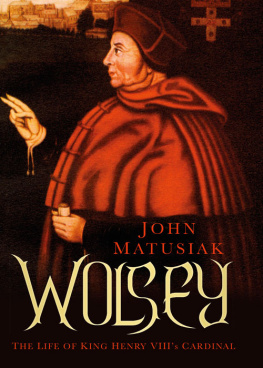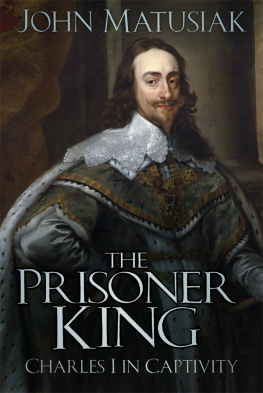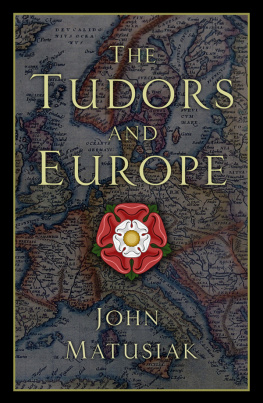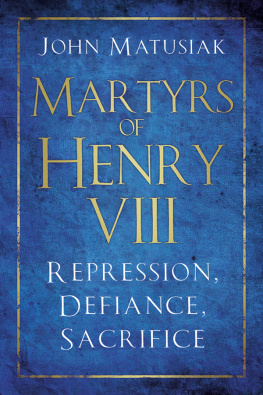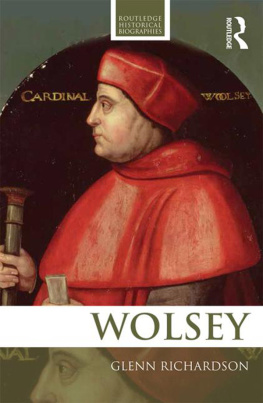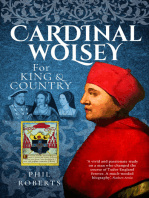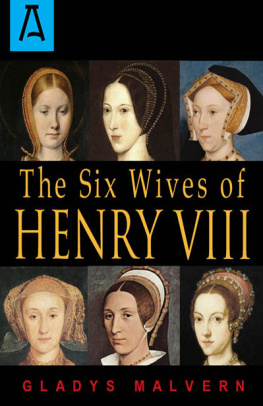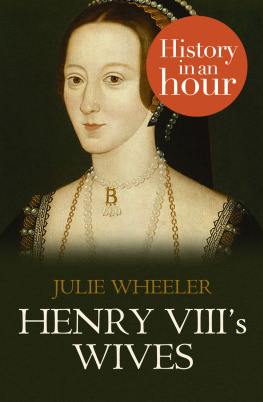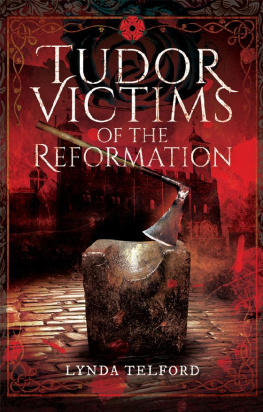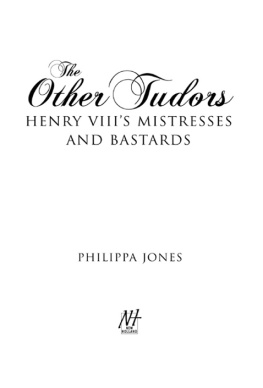
All that hate me whisper together against me:
against me do they devise my hurt.
Psalm xli. 7
In memory of Margaret Czarnecki
10.7.1923 - 11.6.2014
Contents
In a report of 1519 which echoed the universal prejudice of the day, the Venetian ambassador Sebastiano Giustiniani noted tersely that Thomas Wolsey was of low origin. Yet in terms of the rarefied courtly world that he frequented, the Italians remark could hardly have been more apt, for the cardinal who by then had come to vie with princes is said to have grown up above a butchers shop in the provincial port and market town of Ipswich, at the left corner of a little avenue leading down to the churchyard of St Nicholas. According to the Court Rolls relating to the borough, the premises had cost a total of 8 6 s 8 d to purchase, which, by the humble standards of the day, was no mean sum for any moderately successful tradesman to acquire. But if it smacked of thrift and earnest endeavour, the amount involved was hardly suggestive of grace or privilege. And the common well that the property shared with the neighbouring family of a certain Edward Winter provides ample proof of its limitations.
By contrast, the date of Wolseys birth is altogether more uncertain. In the same report, Giustiniani observed that the cardinal was about 46 years of age, placing his birth towards the end of 1472 or in the early part of 1473. But the Abbot of Winchcombes claim in August 1514 that Wolsey was then under 40 indicates a slightly later alternative. And calculations based upon the date of his ordination in March 1498 offer little further assistance, for if the minimum age of admission into the priesthood was 24, the only certainty is that Wolsey cannot have been born later than 1474.
Nevertheless, some inspired guesses have stood the test of time and two in particular are worthy of special consideration. Writing in 1724, it was Sir Richard Fiddes who first suggested that Wolseys Christian name might well be linked to the feast of St Thomas Aquinas on 7 March and this particular notion has always had its fair share of advocates. The year, on the other hand, has often been reckoned at 1471 from the evidence of George Cavendish, a trusted member of the cardinals household who would later become his most notable biographer. Neither proposal, therefore, is without a respectable pedigree. But it is not until the two dates are used in combination that their full interest emerges, for if Englands most remarkable statesman really did make his entrance in March 1471 or thereabouts, he could hardly have done so in more inauspicious circumstances.
Only two months earlier a marvellous blazing star, marked by a white flame of fire fervently burning, was said to have lit up the sky for twelve nights on end, while throughout March itself great storms and tempests from the sea raged continually. For some while, too, an outbreak of bubonic plague had been delivering what Sir John Paston considered the most universal death he had ever witnessed in England. Most ominously of all, however, this was a time when the peace of the realm was hanging by the slenderest of threads. Little more than a year before, the Earl of Warwick, the Kingmaker, had changed sides to depose his sovereign, and though Edward IV soon returned in triumph it would require two grim battles, at Barnet and Tewkesbury, not to mention the violent death of Henry VI in the Tower, to restore temporary peace.
Yet, for all its tribulations, this was also a time of rich opportunity for any thrusting individual suitably endowed with an eagle eye for advancement. And Robert Wolsey who, like his son, would always spell his name Wulcy was, it seems, just such a person. Throughout the fifteenth century, in fact, successive generations of Suffolk Wolseys had fashioned modest livings as butchers, while at Dunwich, Yoxford and Blythburgh the more enterprising of them had also made their way as innkeepers. But despite his sturdily plebeian roots, Thomas Wolseys father was not, it seems, inclined to mediocrity and for this reason he moved as a young man to Ipswich from his native village of Combs, near Stowmarket, bent on making good. Furthermore, by the time that Thomas the first of his four children was born, he was already combining the roles of butcher, innkeeper and grazier, and, in the process, confidently outstripping his forebears.
Crucially, he had achieved a lucrative marriage to a member of a well-connected East Anglian family that had come over the years to dominate several local villages, and though Joan Daundy was not quite of gentle stock, her dowry was nevertheless a more than handy acquisition. Indeed, a potent combination of her fathers means and her husbands methods would soon be yielding such solid dividends that by 1475 the Wolseys had moved from the parish of St Mary Elms, where their famous son was born, to the more central location where he was to spend his childhood. By around 1480, moreover, an Ipswich monk named Fetherstone was referring to a local squire called Wolci who, besides fattening cattle on his meadow near the town, was also selling wool to the English market in Calais. Indeed, well before his death in the autumn of 1496, Squire Wolsey had, it seems, actually acquired sufficient means to retire in comparative comfort.
The rest from his lifes labours was surely welcome, too, for the head of the Wolsey household had striven long and hard to better himself, and suffered his fair share of indignities along the way. As a newcomer to Ipswich, possibly unfamiliar with the tangle of civic ordinances impeding his enterprise and doubtless keen to make his mark in any event, it had not been long before he was making regular appearances before the local magistracy. Arraigned at first for keeping a hospicium or inn, where he is said to have sold victuals for excessive gain, he also found himself in court shortly afterwards when he and a Stowmarket butcher by the name of John Wood were accused of selling bad pies.
Although the fines involved were comparatively light, by the time that Thomas was 9 his father was said to be the greatest offender before the leet. Not only had he gone on to brew ale and sell it in illegal measures, he had also supplied horse feed for excessive profit, permitted his pigs to wander at large within the borough precincts and failed to maintain the guttering in front of his house. Later, he would be indicted yet again: first, for defiling the highway with filth from his stables instead of placing it within the public pits provided for the purpose, and then, as a final flourish, for fostering harlots and adulterers within his house against the kings peace.
Despite these scrapes and setbacks, however, Robert Wolsey continued to grow in wealth and came ultimately to be something of a fixture in the community. No doubt, too, the son beheld in his fathers progress signs of what was required by the times, for a bold head and stout heart could, it seems, open many a door. Though he would never manage to become a free burgess of the borough of Ipswich and thereby gain the right to vote, Wolsey senior still served his turn for three years as churchwarden of St Nicholas and acquired further property at St Mary Stoke, along with farmland at Sternfield-by-Farnham, a village some 24 miles away.
Likewise, at his death he was not only able to bequeath funds for a painting of an archangel above the altar of his parish church but also to leave other money to guarantee that masses should be sung for both him and his friends over the space of one whole year. And if his house just down from the Cornhill, past Rosemary Lane and Dogs Head Street, provided a somewhat modest address for any aspiring bourgeois, at least it stood at the heart of things. Nearby rose the massive church of St Peter and behind that the humbler but still august edifice of Ipswich Grammar School, founded in 1476 by a local mercantile elite which was thriving at that time as never before.
Next page
